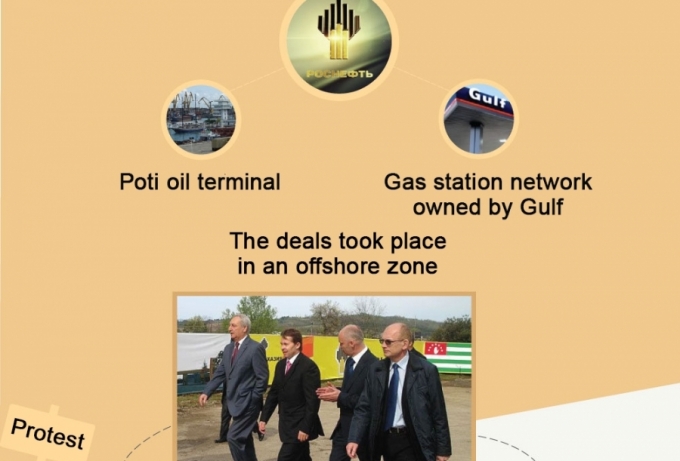
Policy shift in Abkhazia: Is Rosneft no longer welcome?
7 აგვისტო 2015 ShadowSource: Georgian Journal
Project Damoukidebloba.com was created by a grassroots social group that was brought together by Giorgi Kldiashvili and Levan Avalishvili, founders of a hybrid NGO called IDFI (Institute for Development of Freedom of Information). The group is an informal union, open to anyone wishing to become actively involved in exposing Russian propaganda and “soft power” in Georgia at a social level.
The purpose of the group is to inform the people about ongoing and past attempts aimed at subverting Georgian independence.
According to recently discovered information, the Abkhazian de facto MP Tengiz Agrba has called upon local society to become involved in implementing a moratorium on offshore oil field development – an issue that was discussed by the so-called Abkhazian parliament on July 29. (According to Nasha  Abkhazia, the issue was removed from the agenda and its discussion postponed.)
Abkhazia, the issue was removed from the agenda and its discussion postponed.)
“I believe that it is hard to overestimate the importance of this issue for Abkhazia, which in turn makes it even more vital for our MPs to express their stances on oil field development. I call upon everyone not indifferent to Abkhazia’s fate to gather in front of the parliament building. Let this be a sort of a referendum, with people’s representatives openly stating their opinions in front of their very electorate,” Agrba said.
According to him, the current government promised to implement a moratorium on the subject in question even while still in opposition, but the matter was not brought to a conclusion after the government came into power.
Agrba claims that disregarding the interests of the Abkhazian people and “state” in favor of Rosneft and a tiny group of people growing richer is unthinkable.
In parallel to occupied Abkhazia, the Russian company Rosneft operates in Georgia’s other territories as well. As research conducted by Damoukidebloba.com reveals, the company entered the Georgian market in 2014, upon announcing its purchase of 49 percent of shares of Petrocas Energy Limited. This arrangement, however, is not recorded in Georgia’s Public Registry, due to it taking place by the means of offshore companies.
Petrocas Energy Limited is one of the largest oil companies active in Georgia, exporting oil from Europe and providing it to Georgian gas station operators. According to the company’s representatives, it owns a share of an oil terminal in Poti as well as one of Georgia’s gas station networks.
Representatives of Rosneft claim that they purchased 49 percent of Petrocas shares from Davit Iakobashvili, a businessman active in Russia and other countries. The remaining shares remained in Iakobashvili’s hands. It is noteworthy that 69.5 percent of Rosneft’s own shares are owned by OJSC Rosneftegaz, which in turn is fully owned by the Russian government. This effectively makes Rosneft a state-owned company.
The aforementioned agreement between Rosneft and Petrocas was immediately followed by protests from the parliamentary minority and a considerable part of Georgian society. Minority MPs have demanded the government prevent the sale of the Poti oil terminal to a Russian company. A petition composed by Georgian citizens stated that the Law on Occupied Territories was being violated by this transaction. This law prohibits any economic activity that requires the Georgian government’s permission or licensing on occupied territories and offshore areas.
The Georgian government’s representatives have responded to the protests by claiming that they do not have the power to stop a business agreement between two enterprises.
“This transaction took place via offshore accounts. Unfortunately, we do not have any means of exercising control over them. Even though we are being accused of selling things to Russian companies, it can be plainly seen who is actually selling Georgian property to the Russians. Therefore, accusations leveled at us are absolutely unjustified,” Georgia’s Economy Minister Giorgi Kvirikashvili stated.
The “offshore companies” excuse has also become the reason why there were no sanctions placed against Petrocas by the Georgian government. The situation remained unchanged even after Rosneft ended up on the list of companies sanctioned by the EU and USA following the Russian invasion of Crimea.
Rosneft – Above Georgian law?
It is unknown precisely what results and experience Georgia’s Economy, Justice and Foreign ministries have received, but what our authorities have  failed to establish is told by Rosneft itself on its official page.
failed to establish is told by Rosneft itself on its official page.
Judicial transaction via offshore companies was confirmed by Rosneft, along with purchase of 49 percent of Petrocas Energy’s shares on December 29, 2014. Petrocas is officially fully owned by an offshore company named Nextra Services Limited, while the entire business is property of Georgia-born businessman Davit Iakobashvili, who is responsible for selling the shares to Rosneft. This was confirmed by Gulf.
The most amusing thing is that Georgian government spent seven months to find out and verify the very facts that neither Petrocas nor Rosneft try to hide.
It is also noteworthy that Rosneft is among the Russian companies sanctioned by the EU, U.S., Switzerland and Norway for occupation of the Ukrainian peninsula of Crimea and support of separatism in Donbas region.
Georgia, however, never joined these sanctions; nor did it sanction Rosneft in any way for violation of state law.